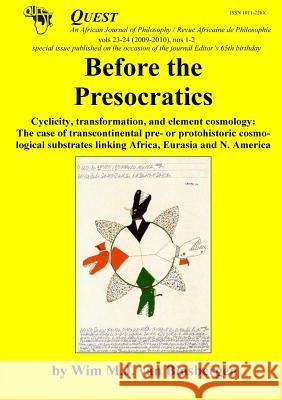Before the Presocratics: Cyclicity, transformation, and element cosmology: The case of transcontinental pre- or protohistric cosmological substrates linking Africa, Eurasia and N. America » książka
Before the Presocratics: Cyclicity, transformation, and element cosmology: The case of transcontinental pre- or protohistric cosmological substrates linking Africa, Eurasia and N. America
ISBN-13: 9789078382157 / Angielski / Miękka / 2013 / 400 str.
Before the Presocratics: Cyclicity, transformation, and element cosmology: The case of transcontinental pre- or protohistric cosmological substrates linking Africa, Eurasia and N. America
ISBN-13: 9789078382157 / Angielski / Miękka / 2013 / 400 str.
(netto: 365,17 VAT: 5%)
Najniższa cena z 30 dni: 384,49
ok. 16-18 dni roboczych
Bez gwarancji dostawy przed świętami
Darmowa dostawa!
This book traces the evolution of thought since the Palaeolithic, claiming: (1) we can reconstruct modes of thought of the remote past; (2) such reconstruction is predicated on: (a) the fundamental unity of (Anatomically Modern) humankind, (b) the porous nature of geographical / political / cultural boundaries. Focusing on the rise of philosophy in Ancient Greece, that development is argued to be an aberration of (1) an ancient and widespread cosmological model: In Eurasia, Africa and N. America, the transformative cycle of elements has constituted a global substrate since the Upper Palaeolithic. Alternatively, (2) the transformative cycle of elements may be claimed to date only from the West Asian Bronze Age, while (3) its transcontinental transmission may be even more recent. (2) and (3) are empirically vindicated - Upper Palaeolithic element cosmologies abounded, but lacked cyclicity, transformation, and catalysis. Against this context in space and time, not Empedocles' originality disappears.
This book traces the evolution of thought since the Palaeolithic, claiming: (1) we can reconstruct modes of thought of the remote past; (2) such reconstruction is predicated on: (a) the fundamental unity of (Anatomically Modern) humankind, (b) the porous nature of geographical / political / cultural boundaries. Focusing on the rise of philosophy in Ancient Greece, that development is argued to be an aberration of (1) an ancient and widespread cosmological model: In Eurasia, Africa and N. America, the transformative cycle of elements has constituted a global substrate since the Upper Palaeolithic. Alternatively, (2) the transformative cycle of elements may be claimed to date only from the West Asian Bronze Age, while (3) its transcontinental transmission may be even more recent. (2) and (3) are empirically vindicated - Upper Palaeolithic element cosmologies abounded, but lacked cyclicity, transformation, and catalysis. Against this context in space and time, not Empedocles originality disappears.











